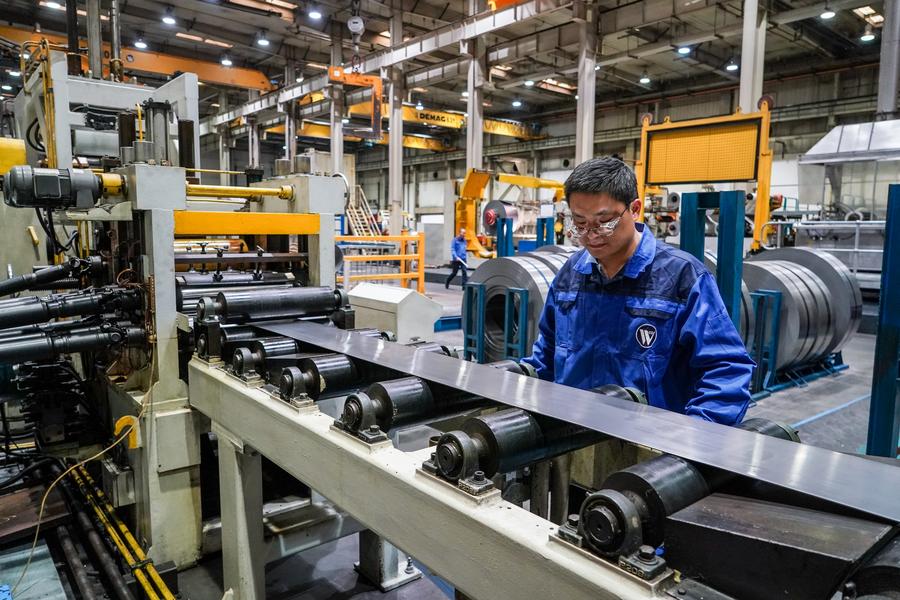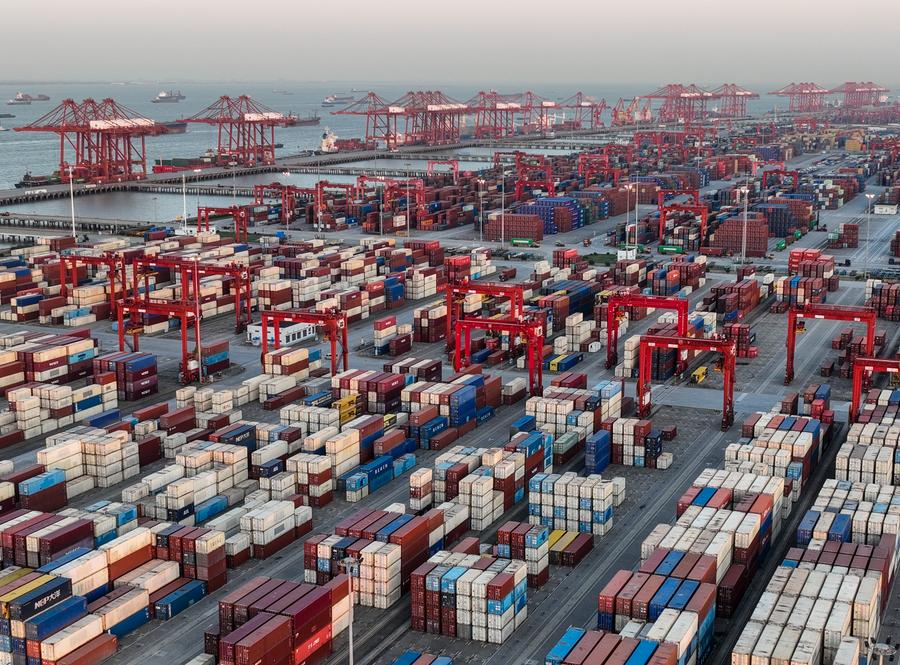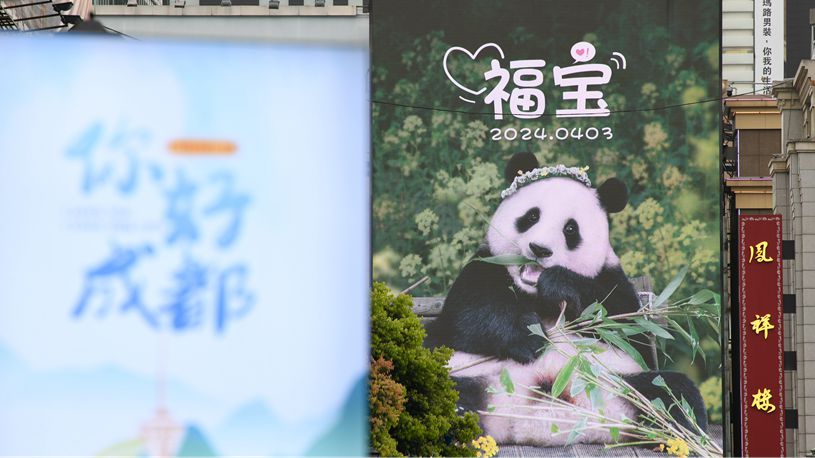* Some German entrepreneurs see China's market as a "gym" where multinational companies can experience rapid growth through both competition and cooperation.
* German investment in China accounted for 10.3 percent of the country's total overseas investment in 2023, the highest since 2014, reported the German Economic Institute.
NANJING/BERLIN, April 4 (Xinhua) -- If one comes to Taicang, a booming town of Suzhou, east China's Jiangsu Province, and takes Bus Route 103 to travel in the city's Hi-Tech Industrial Development Zone, one can easily find many bus stops named after German companies including Kern Liebers, Trumpf, Haering, Tox.
The bus starts its journey on Nanjing East Road in Taicang at "Kern Liebers Station," traversing four kilometers and connecting over 40 German companies. The bus route strings together an entire supply chain, making it convenient to gather all the components required for a new energy vehicle's electric propulsion system.
Such an observation may shed light on why the pragmatic and prudent Germans choose to flock to China's market.

HOME TO GERMAN ENTERPRISES
Since the early 1990s, Taicang spent 14 years attracting its initial 100 German investors, but it took the city only three more years to attract another 100 German enterprises. It is often said that one could manufacture a car without ever leaving Taicang, as 70 percent of the required auto parts can be sourced from the city.
Kern Liebers was among the first German companies to recognize Taicang's business potential. Starting with a 400-square-meter rented factory and a team of six employees in 1993, this major producer of car seat belt springs has since embarked on 11 successive rounds of investment in Taicang. Today, its Taicang facility spans 70,000 square meters and generates an annual output value of around 1.5 billion yuan (over 207 million U.S. dollars).
The success of Kern Liebers in Taicang made a big splash in Germany, with over 500 German enterprises currently setting up operations in the city.
From a sales office to a company covering production, R&D, sales and services, Chiron Group, a leading German company in machine tool manufacturing, has expanded its Taicang factory three times in size since 2012.
"We have a big trust in China and especially in Taicang to continue our business. Our forecast looks quite stable for 2024; we want to have around 20 to 30 percent growth," said Willi Riester, CTO of Chiron Machine Tool (Taicang) Co., Ltd.
Data from numerous German research institutes show that Sino-German economic and trade cooperation has bounced back amidst growing global trade tensions, with an increasing number of German enterprises accelerating their presence in China.
German investment in China accounted for 10.3 percent of the country's total overseas investment in 2023, the highest since 2014, reported the German Economic Institute, saying that German companies still deem China as a huge buoyant market and plan to increase their business.

AMICABLE BUSINESS ENVIRONMENT
Richard Zhang, formerly employed by Kern Liebers and currently serving as chairman of the Board of Taicang Roundtable, a group of more than 100 largely German businesses, highlighted Taicang's allure to German businesses. Taicang's compact size is appealing, and its location also has strategic significance, Zhang said.
Located only about 50 kilometers to the west of downtown Shanghai, Taicang boasts the largest container port along the Yangtze River, China's longest river, with its container throughput exceeding 8 million twenty-foot equivalent units in 2023.
"Taicang is an ideal place to start a business, with regard to its connection with Shanghai and the self-contained infrastructure construction," said Andreas Hornfischer, general manager of E.G.O. Components (China) Co., Ltd., who values the town's potential in talent supply and industrial supply chain.
Taicang has, in the first place, displayed patience and ambition in fostering a forward-looking industrial ecosystem. As an example of its determination, the city once spent five years on negotiations for a German-funded investment project valued at 1 million U.S. dollars, when other cities across the country preferred chasing after large-scale projects.
In addition, the city cut down on 70 percent of the administrative approval procedures and simplified 72 percent of the checklists for applications.
"Creating a welcoming business environment significantly enhances productivity," said Wang Xiangyuan, Party chief of Taicang.
Beumer Group, the 500th German company to settle in Taicang this January, is optimistic about its development in China's market, aiming to double its business volume in the next decade.
Adrian Siu, managing director of Adidas Greater China, said that China stands as one of the world's largest consumer markets and holds immense strategic significance for multinational companies, including Adidas. Moreover, China's consumer market leads globally in digitalization, spearheading advancements in areas like digital retail and supply chain management.

MAGNET TO FOREIGN INVESTORS
Recent short-term fluctuations in China's economy have led some people in the West to say China's comparative strength is reaching its peak and even advocate for "decoupling" and "de-risking" from China. However, data indicates that China continues to be a magnet to foreign investors, including Germans.
A business confidence survey conducted by the German Chamber of Commerce in China this January showed that 91 percent of German investors said they intend to continue their operations in China, and more than half said they plan to increase investment in China in the coming two years.
An article authored by experts from Bundesbank holds that many German industrial firms have generated substantial sales and profits from production in China and high revenues from exports to China. Nearly one out of every two firms in the manufacturing sector directly or indirectly sources critical intermediate inputs from China, said the article.
China now possesses all the industrial categories in the United Nations industrial classification and has nurtured 12,000 "little giant" firms, over 90 percent of which are suppliers to well-known large enterprises both at home and globally.

Some German entrepreneurs see China's market as a "gym" where multinational companies can experience rapid growth through both competition and cooperation. They believe foreign-invested companies will expedite their transformation and upgrading while achieving localized development.
"In China, Adidas is realizing product development upgrades and supply chain efficiencies through digital technology applications and the creation of new opportunities, precipitating Chinese experience in marketing innovation." Adrian Siu said.
"We hope that our practices in supply chain, digital retail, and logistics will provide experience and guidance for Adidas' global development," he said, adding that China leads the world in fabric research and development, production technology, and efficient coordination across the entire industry chain.
(Video reporters: Zheng Kaijun, Xia Peng, Liu Yuxuan, Chen Shengwei; Video editors: Xia Peng, Zheng Kaijun, Hu Xiaoming) ■












